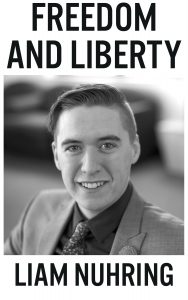 Let me start with a brief story: It was the fall of 2013, one of the first few days of school after graduating high school. My inquiry class was my first taste of college. After a few “get to know you” games, the class settled in for some background information on the class structure. I can’t recall how we got on the subject of job creation, but I mustered up the confidence in front of all these new faces to make a comment about the necessity of economic independence in Nepal, being promoted by the money the climbers who sought to summit Mt. Everest brought to the region. A voice commented with a bubbly and positive demeanor, “Now you’re thinking like a liberal!” Perhaps it was the lack of response on my behalf that prompted the professor to ask me, “Are you a Republican?” To which I responded, “Yes I am.” The professor’s lips folded into a slight smile and they retorted, “We’ll change that.”
Let me start with a brief story: It was the fall of 2013, one of the first few days of school after graduating high school. My inquiry class was my first taste of college. After a few “get to know you” games, the class settled in for some background information on the class structure. I can’t recall how we got on the subject of job creation, but I mustered up the confidence in front of all these new faces to make a comment about the necessity of economic independence in Nepal, being promoted by the money the climbers who sought to summit Mt. Everest brought to the region. A voice commented with a bubbly and positive demeanor, “Now you’re thinking like a liberal!” Perhaps it was the lack of response on my behalf that prompted the professor to ask me, “Are you a Republican?” To which I responded, “Yes I am.” The professor’s lips folded into a slight smile and they retorted, “We’ll change that.”
Certainly you’ve heard of the term “the Concordia bubble” — you know, the idea that Concordia’s campus tends to act as an isolated region within the broader community. Well, I would like to suggest another term to be added to the repertoire of common Concordia slang: “the Concordia echo chamber.”
We’ve all been there. You’re sitting in class, discussing a political, social, cultural issue or phenomena with your peers. Maybe it’s your inquiry class, or maybe it’s your 300-level religion class; the class in question isn’t necessarily relevant. What is relevant, however, is the fact that discussions in class, at least in my personal experience and in the experiences of many of my peers, tend to morph into one-sided discussions and result in a general consensus surrounding the issue in question.
Coming to a consensus sounds great to me, to be perfectly honest; cooperation from all parties, and a suitable solution being developed? This is how the world works; politics generally come down to compromise. However, compromise indicates that there was prior conflict or disagreement. To compromise in politics clearly has connotations of prior difficulty in reaching a consensus.
This is how the world works.
In the classroom, debate around sometimes controversial issues tends to become one sided, with little academic scrutiny involved.
Recently, a survey was conducted by a politically active student on campus which set out to truly uncover the political demographics of the student body of Concordia College. With a substantial sample size, relatively evenly distributed among all class years and areas of study, the results indicated that 34.5 percent of Concordia College’s student population identified as conservative, with the remainder identifying as liberal.
You wouldn’t believe this data point to be true if you sat in on a few classes. The debates that rise tend to be one-sided, and thus, counterproductive.
I was shocked too. I thought we were few and far between, the last of us to survive the indoctrination process (I don’t actually believe there’s an indoctrination process, that sounds like a conspiracy theory of the far alt-right). What I do believe, however, is that there is an unrepresented voice of one third of Concordia’s students on campus — a voice that I try my best to represent, oftentimes met with scrutiny.
The purpose of an education at Concordia College involves dissecting and interpreting alternative points of view. Without this ability, how are you to successfully “BREW”?
Regardless of your demographics or perspective on a multitude of different issues, I encourage you, if nothing else, to simply entertain other ideas and perspectives, especially in the classroom. I’m not asking you to adopt new opinions, but rather be more open to other points of view. When we respect one another and hear what each other has to say, we can begin to make progress and successful bipartisan compromise.


Every single university and college in all of North America is an “echo chamber” as you would put it. I actually put off going to university for a year as i was afraid of being persecuted for my slight amount of political discourse, but here I am now.
This is true. In the name of liberalism, the discussions in liberal arts type classes is anti-liberal. Any dissenting views are written off. Its popular to give lip service to caring about minorities (great!) but anyone with a minority political viewpoint is literally laughed at, ridiculed, and written off as some second class dum& a$$. Hypocritical. Judgmental. Frustrating.